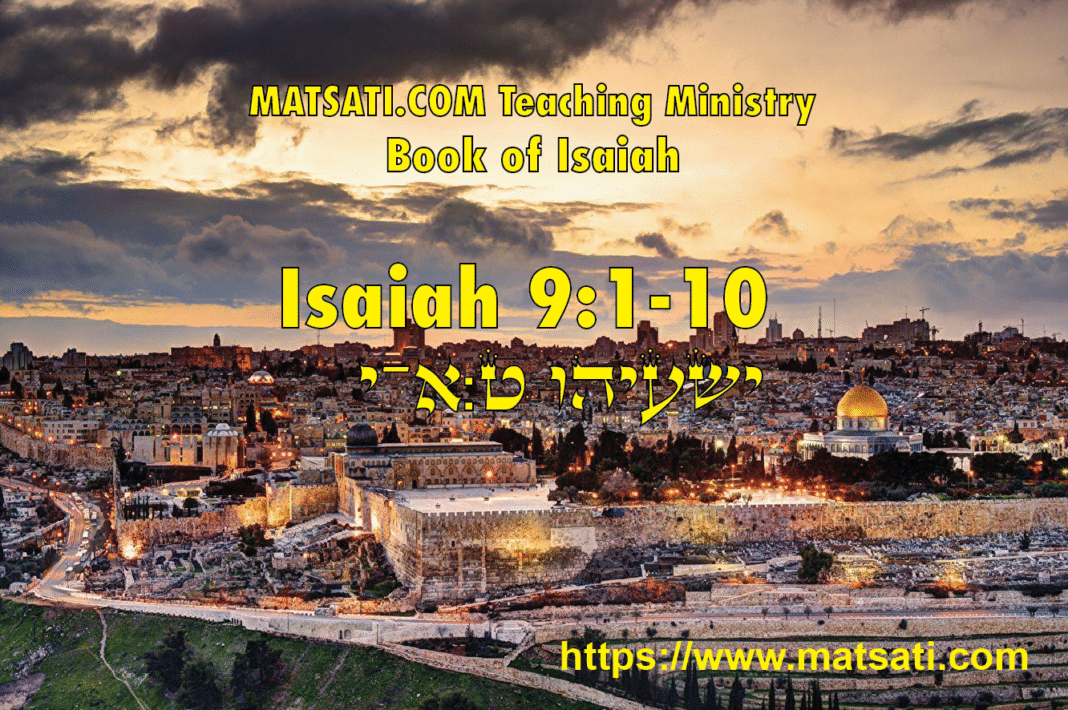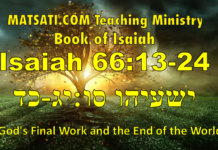Table of Contents
Introduction to Isaiah 9:1-10
Chapter 9 is the end of the child savior king motif that Isaiah had begun in chapter 7. In Isaiah 7, we are told how Ahaz has led the people away from the Lord to trust not just in a foreign nation but also in their gods which lead to their ultimate destruction, depression, and continued war. The Lord however will bring a child into this world who will end these things and lead the people into God’s truth. These things reveal to us how important it is no matter what to trust in the Lord seeking His help for all of our needs. We note how clearly this truth is written according to 2 Chronicles 12.
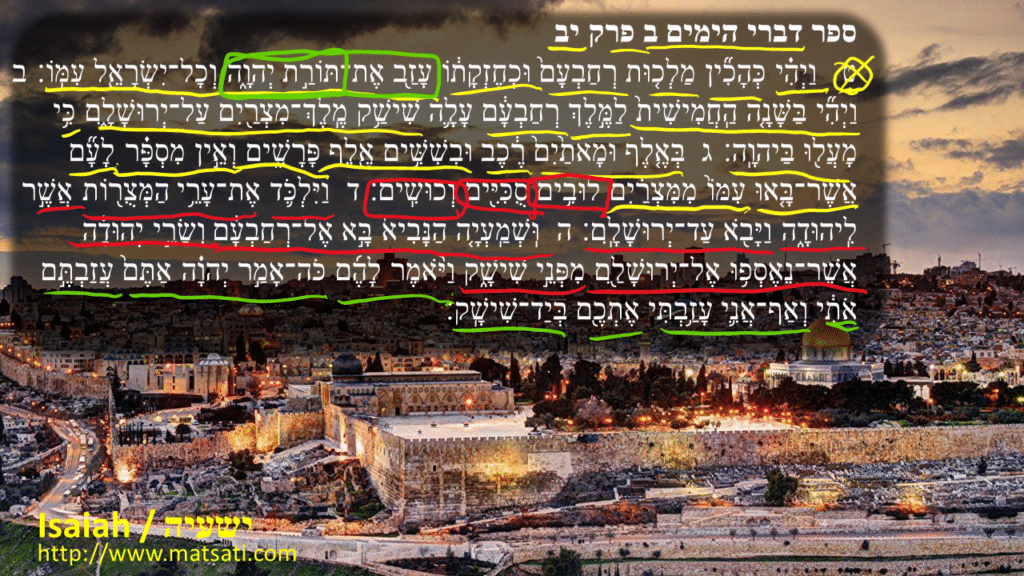
ספר דברי הימים ב פרק יב
ט וַיְהִ֗י כְּהָכִ֞ין מַלְכ֤וּת רְחַבְעָם֙ וּכְחֶזְקָת֔וֹ עָזַ֖ב אֶת־תּוֹרַ֣ת יְהוָ֑ה וְכָל־יִשְׂרָאֵ֖ל עִמּֽוֹ׃ ב וַיְהִ֞י בַּשָּׁנָ֤ה הַֽחֲמִישִׁית֙ לַמֶּ֣לֶךְ רְחַבְעָ֔ם עָלָ֛ה שִׁישַׁ֥ק מֶֽלֶךְ־מִצְרַ֖יִם עַל־יְרוּשָׁלִָ֑ם כִּ֥י מָעֲל֖וּ בַּיהוָֽה׃ ג בְּאֶ֤לֶף וּמָאתַ֙יִם֙ רֶ֔כֶב וּבְשִׁשִּׁ֥ים אֶ֖לֶף פָּרָשִׁ֑ים וְאֵ֣ין מִסְפָּ֗ר לָעָ֞ם אֲשֶׁר־בָּ֤אוּ עִמּוֹ֙ מִמִּצְרַ֔יִם לוּבִ֥ים סֻכִּיִּ֖ים וְכוּשִֽׁים׃ ד וַיִּלְכֹּ֛ד אֶת־עָרֵ֥י הַמְּצֻר֖וֹת אֲשֶׁ֣ר לִֽיהוּדָ֑ה וַיָּבֹ֖א עַד־יְרוּשָׁלִָֽם׃ ה וּֽשְׁמַֽעְיָ֤ה הַנָּבִיא֙ בָּ֣א אֶל־רְחַבְעָ֔ם וְשָׂרֵ֣י יְהוּדָ֔ה אֲשֶׁר־נֶאֶסְפ֥וּ אֶל־יְרוּשָׁלִַ֖ם מִפְּנֵ֣י שִׁישָׁ֑ק וַיֹּ֨אמֶר לָהֶ֜ם כֹּה־אָמַ֣ר יְהוָ֗ה אַתֶּם֙ עֲזַבְתֶּ֣ם אֹתִ֔י וְאַף־אֲנִ֛י עָזַ֥בְתִּי אֶתְכֶ֖ם בְּיַד־שִׁישָֽׁק׃
2 Chronicles 12:1-5
12:1 And it came to pass, when Rehoboam had established the kingdom, and had strengthened himself, he forsook the law of the Lord, and all Israel with him. 12:2 And it came to pass, that in the fifth year of king Rehoboam Shishak king of Egypt came up against Jerusalem, because they had transgressed against the Lord, 12:3 With twelve hundred chariots, and threescore thousand horsemen: and the people were without number that came with him out of Egypt; the Lubims, the Sukkiims, and the Ethiopians. 12:4 And he took the fenced cities which pertained to Judah, and came to Jerusalem. 12:5 Then came Shemaiah the prophet to Rehoboam, and to the princes of Judah, that were gathered together to Jerusalem because of Shishak, and said unto them, Thus saith the Lord, Ye have forsaken me, and therefore have I also left you in the hand of Shishak. (KJV)
Here the Lord states that because Rehoboam and the people Left God’s Torah, the enemy came upon them, attacking, taking cities, coming as far as Jerusalem. When the Scripture states they left Torah, this involves a very broad number of things, from seeking the Lord, to idolatry, adultery, sexual sin, false hoods, unrighteousness, unholiness, etc. This is the outcome of those who walk away from the Lord and His ways according to the scripture. The end of these things when brought to their conclusion is destruction!
Isaiah continues speaking of the king who will come being raised in the ways of the Lord and ending the war, establishing an eternal kingdom, and leading the people in God’s truth and righteousness. Previously in Isaiah 7 the prophet describes the child as עִמָּ֥נוּ אֵֽל to express the relationship between the Lord God of Israel and His people. In Isaiah 8 we are told the child’s name will be מַהֵ֥ר שָׁלָ֖ל חָ֥שׁ בַּֽז a description of what is about to take place, destruction, looting, and great loss. The Child described in Isaiah 9 will have a saving kingdom, one that teaches the truth of God and God’s ultimate purpose of dwelling in our midst. The Lord does not want our destruction, He wants what is best for us, but when we walk away from Him and His truth, we allow the enemy to attack. This reminds us that we are not to rely upon our own resources but to trust in the Lord. Turning from the Lord and His ways leads to depression and darkness. What Isaiah is explaining is that the Lord God Almighty will bring a great deliverance through a coming king, while simultaneously giving the people a warning to walk in the instruction and testimony of God. We note that the purpose of salvation is not to live however we want! The reason being our covenant relationship with God leads to the Lord God working in our lives and setting us free by His delivering power. All of these concepts are drawn together in this child king whom God is bringing into this world for this very purpose.
Isaiah opens chapter 9 saying the following:
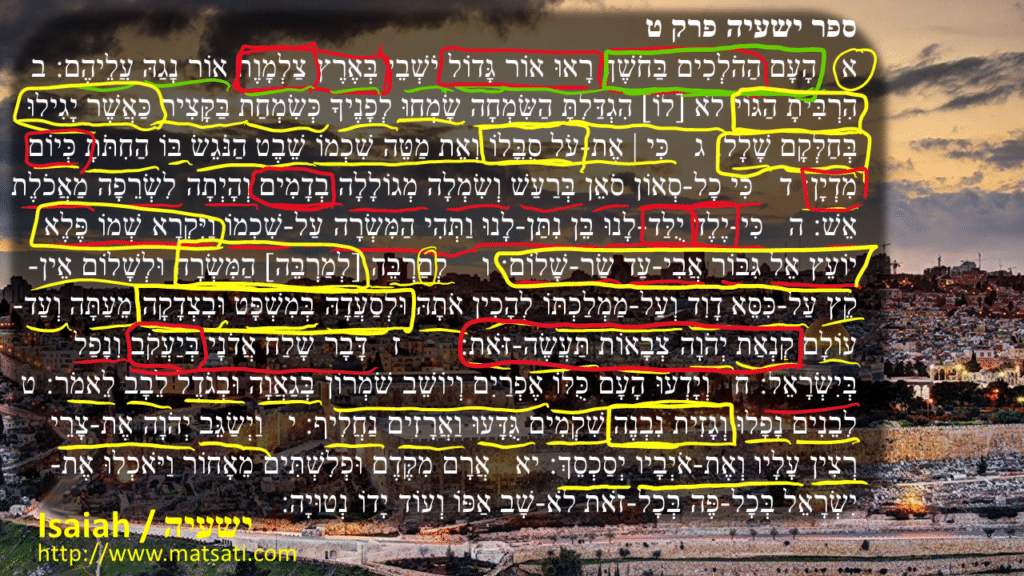
ספר ישעיה פרק ט
א הָעָם הַהֹלְכִים בַּחֹשֶׁךְ רָאוּ אוֹר גָּדוֹל יֹשְׁבֵי בְּאֶרֶץ צַלְמָוֶת אוֹר נָגַהּ עֲלֵיהֶם:
Isaiah 9:2 states, “The people that walked in darkness have seen a great light: (הָעָם הַהֹלְכִים בַּחֹשֶׁךְ רָאוּ אוֹר גָּדוֹל) they that dwell in the land of the shadow of death, upon them hath the light shined. (יֹשְׁבֵי בְּאֶרֶץ צַלְמָוֶת אוֹר נָגַהּ עֲלֵיהֶם)” The opening verse reminds us of Matthew 4:16.
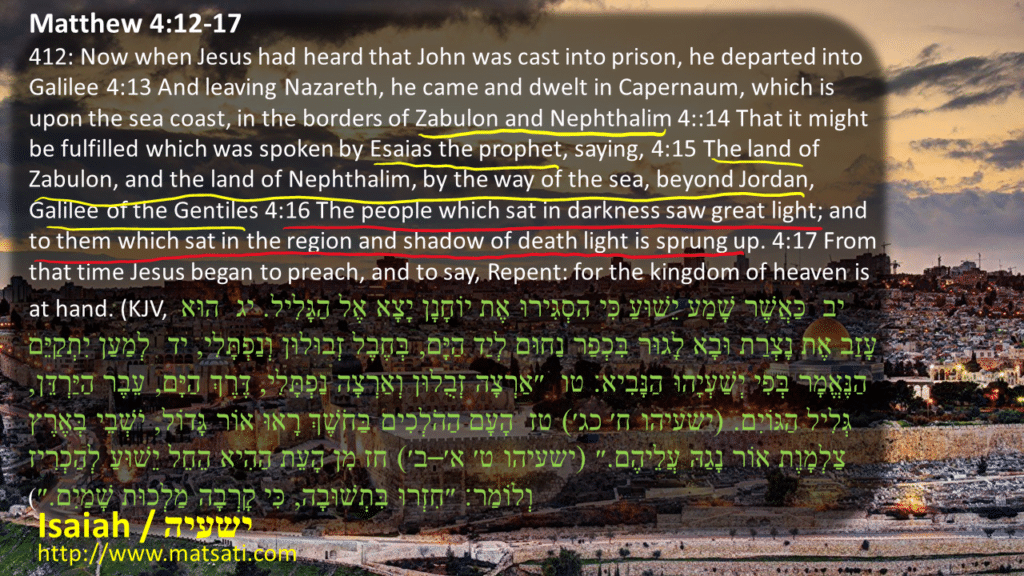
Matthew 4:12-17
412: Now when Jesus had heard that John was cast into prison, he departed into Galilee 4:13 And leaving Nazareth, he came and dwelt in Capernaum, which is upon the sea coast, in the borders of Zabulon and Nephthalim 4::14 That it might be fulfilled which was spoken by Esaias the prophet, saying, 4:15 The land of Zabulon, and the land of Nephthalim, by the way of the sea, beyond Jordan, Galilee of the Gentiles 4:16 The people which sat in darkness saw great light; and to them which sat in the region and shadow of death light is sprung up. 4:17 From that time Jesus began to preach, and to say, Repent: for the kingdom of heaven is at hand. (KJV, יב כַּאֲשֶׁר שָׁמַע יֵשׁוּעַ כִּי הִסְגִּירוּ אֶת יוֹחָנָן יָצָא אֶל הַגָּלִיל. יג הוּא עָזַב אֶת נָצְרַת וּבָא לָגוּר בִּכְפַר נַחוּם לְיַד הַיָּם, בְּחֶבֶל זְבוּלוּן וְנַפְתָּלִי, יד לְמַעַן יִתְקַיֵּם הַנֶּאֱמָר בְּפִי יְשַׁעְיָהוּ הַנָּבִיא׃ טו ״אַרְצָה זְבֻלוּן וְאַרְצָה נַפְתָּלִי, דֶּרֶךְ הַיָּם, עֵבֶר הַיַּרְדֵּן, גְּלִיל הַגּוֹיִם. (ישעיהו ח׳ כג׳) טז הָעָם הַהֹלְכִים בַּחֹשֶׁךְ רָאוּ אוֹר גָּדוֹל, יֹשְׁבֵי בְּאֶרֶץ צַלְמָוֶת אוֹר נָגַהּ עֲלֵיהֶם.״ (ישעיהו ט׳ א׳–ב׳) חז מִן הָעֵת הַהִיא הֵחֵל יֵשׁוּעַ לְהַכְרִיז וְלוֹמַר׃ ״חִזְרוּ בִּתְשׁוּבָה, כִּי קָרְבָה מַלְכוּת שָׁמַיִם.״)
We note the narrative in Matthew chapter 4, Yeshua is tempted in the wilderness, and then he begins fulfilling the prophecy of Isaiah going to the borders of Zevulon and Nephtali. This particular aspect of Isaiah is speaking to the destruction of northern Israel and the tribes Zebulun and Naphtali are at the northern border of Israel. The greatness of Israel’s idolatry, adultery, and sin led to her destruction and loss of the northern tribes to Assyria and so this quote from Isaiah speaks to this child king, to the Messiah whom God would bring to save His people, and the idea that Isaiah is providing for us here is הָעָם הַהֹלְכִים בַּחֹשֶׁךְ רָאוּ אוֹר גָּדוֹל “the people who walked in darkness, have seen a great light” and this light is a reference not just to the Messiah of God, but to the righteousness, holiness, and grace of God to His people bringing the Messiah into the Word for the purpose of deliverance. Remember the rabbinic understanding of the people being worthy of the coming of the Messiah. Another important concept here as God’s mercy is great, even to loving us while we were yet sinners! (John 3:16) Note how a rabbinic concept may be used to illustrate the mercy and power of God.
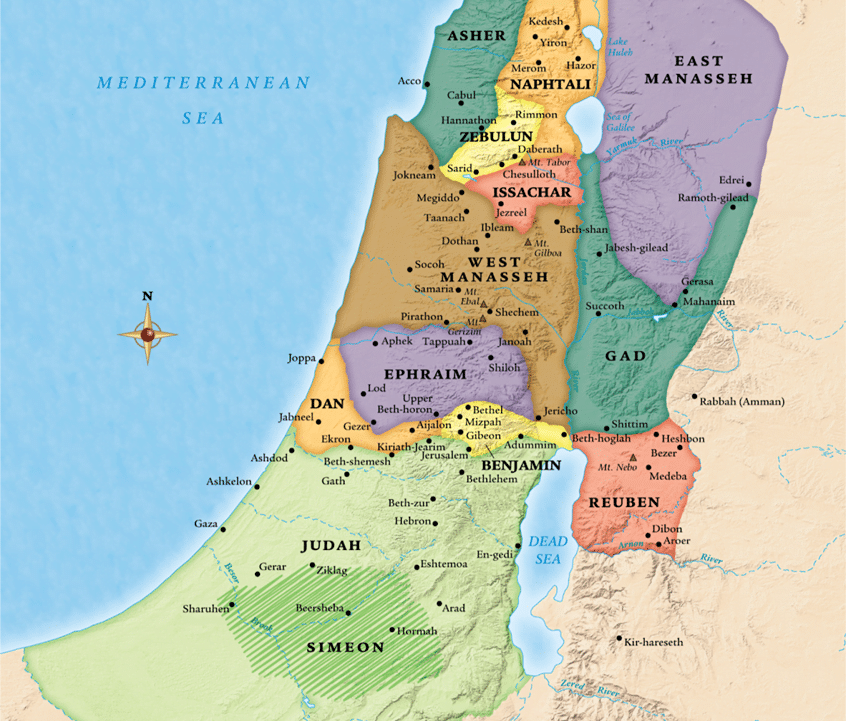
Isaiah says, הָעָם הַהֹלְכִים בַּחֹשֶׁךְ רָאוּ אוֹר גָּדוֹל יֹשְׁבֵי בְּאֶרֶץ צַלְמָוֶת אוֹר נָגַהּ עֲלֵיהֶם “The people that walked in darkness have seen a great light: they that dwell in the land of the shadow of death, upon them hath the light shined.” HALOT defines צַלְמָוֶת as “gloom” which is actually a compound word צַלְ + מָוֶת meaning “Shadow (צַלְ) of death (מָוֶת)” This has the meaning of something that is deeper than חשך (darkness), this is the אֶרֶץ (land) of depression. These things remind us of the darkness of depression, the darkness of what happens to those who do not place their hope, trust, and focus upon the Lord God in heaven. This verse explains to us why there will be no gloom, because there is an announcement of light that appears to give us hope! The significance of הָעָם הַהֹלְכִים בַּחֹשֶׁךְ is that these people are not simply sitting in darkness (יֹשְׁבֵי בְּאֶרֶץ צַלְמָוֶת) they are walking in darkness (הַהֹלְכִים בַּחֹשֶׁךְ). In the Scriptures, God’s presence is paralleled to the light because the light represents His righteousness. This is drawn out in the Torah in the very first few verses, the creation account. The light that God created as the first of His creation was the light. In the absence of the sun, moon, and stars, this can only be that of His righteousness and holiness! The message of Teshuvah (repentance) is coupled to this seeing of the light, as the people who walk in darkness, in order to be set free from their sins, are called to walk in the light, to draw near to the Lord according to His Word. The people can continue to choose to walk in darkness, but if they want to be set free, they need to seek the Lord God and His Messiah, illustrated in the prophetic message of Isaiah. We also realize based on these Scripture, that God’s light needed to shine through the darkness in order to lead and guide the people out from where they are. Again, these things all draw in the Torah context, of creation and an all-powerful God. This is something that no other god is capable of doing, and impossible for those who trust in themselves to modify their own destiny through divination and witchcraft.
ספר ישעיה פרק ט
ב הִרְבִּיתָ הַגּוֹי לֹא [לוֹ] הִגְדַּלְתָּ הַשִּׂמְחָה שָֹמְחוּ לְפָנֶיךָ כְּשִֹמְחַת בַּקָּצִיר כַּאֲשֶׁר יָגִילוּ בְּחַלְּקָם שָׁלָל:
Isaiah 9:3 states, “Thou hast multiplied the nation, (הִרְבִּיתָ הַגּוֹי) and not increased the joy: (לֹא [לוֹ] הִגְדַּלְתָּ הַשִּׂמְחָה) they joy before thee according to the joy in harvest, (שָֹמְחוּ לְפָנֶיךָ כְּשִֹמְחַת בַּקָּצִיר) and as men rejoice when they divide the spoil. (כַּאֲשֶׁר יָגִילוּ בְּחַלְּקָם שָׁלָל)” We note that Isaiah says, הִרְבִּיתָ הַגּוֹי “you have multiplied the nation” suggesting he is talking to Ahaz, the increase in number of the people does not increase their joy. When God’s deliverance is brought to His people, there is an overwhelming sense of joy and peace that only God can give to His people. Isaiah draws in the imagery of war saying, כַּאֲשֶׁר יָגִילוּ בְּחַלְּקָם שָׁלָל “as men rejoice when they divide the spoil” deals with the fears of war and loosing what is ours. Isaiah speaks of the deliverance of God and joy; the real source of our joy is the Lord. (2 Samuel 6:16, Tehillim / Psalms 16:11, 27:4-6)
ספר ישעיה פרק ט
ג כִּי | אֶת-עֹל סֻבֳּלוֹ וְאֵת מַטֵּה שִׁכְמוֹ שֵׁבֶט הַנֹּגֵשֹ בּוֹ הַחִתֹּתָ כְּיוֹם מִדְיָן:
Isaiah 9:4 states, “For thou hast broken the yoke of his burden, (כִּי | אֶת-עֹל סֻבֳּלוֹ) and the staff of his shoulder, (וְאֵת מַטֵּה שִׁכְמוֹ) the rod of his oppressor, as in the day of Midian. (שֵׁבֶט הַנֹּגֵשֹ בּוֹ הַחִתֹּתָ כְּיוֹם מִדְיָן)” Isaiah speaks of the עֹל סֻבֳּלוֹ “yoke of his burden” which draws in the idea of the yoke in which most Christian commentators say is the yoke of the Torah (the law). When we study the Scriptures as a whole, it becomes difficult to say the Torah is a burden to God’s people. For example, the Psalmist states according to Tehillim / Psalms 1, 19, 119, and 40:8, “I delight to do thy will, O my God: yea, thy law is within my heart.” These things reveal to us that God’s laws are not what Peter referred to while speaking to the Jerusalem council when he said, “Now therefore, why do you test God by putting a yoke on the neck of the disciples which neither our fathers nor we were able to bear?” (See Acts 15:10). According to the Scriptures, David delighted in God’s laws, they were his meditation, he longed for them and said they brought freedom, not bondage. He contrasted those who love the mitzvot (commands) of HaShem, those who are the righteous ones of God, with those who reject them (the wicked). Within the context of the Tanakh, how is it possible Peter would suggest that the Torah was the yoke that was too heavy to bear for them or their forefathers? In the context of Acts 15, we learn the topic that is being discussed is concerning how one is to become a disciple if one was not Jewish. Well, the answer for some was to become a proselyte, to be circumcised and take on the yoke of the Torah. This is basically saying that a person was not saved by faith, but by circumcision and by obeying Torah. This is related to the idea of “earning salvation by works” from the sense that one believed through obedience to the Torah one has earned his place in heaven. (Remember, this remains a modern-day fallacy in the Christian teaching that man earned his salvation under the Torah.) This is the question that they all gathered in Jerusalem to answer. Peter said, “But we believe that through the grace of the Lord Yeshua the Messiah we shall be saved in the same manner as they.” (Acts 15:11) These are very important Scriptures concerning the Torah. We have discussed this idea before, that the Torah was not given such that one could earn his salvation. To believe that one could earn their salvation through the Torah is a false doctrine that has been believed from the beginning, as we read Paul teaching on this topic again and again. (i.e. see book of Romans) The Torah was given to a people who are already in a covenant relationship with God through faith! We note the power of God was present and at work even before the people believed by faith. (See Romans 5:8) This is what took place at the mountain of Sinai when the people agreed by faith to seek the Lord God in heaven. What Paul and Peter were teaching here was that we enter into a covenant relationship with God through faith, this is how it has been accomplished since the Garden of Eden. This then follows, that no person is saved by keeping the Torah, neither Jew or Gentile! The question then becomes where does the Torah enter into the life of the believer? The Torah enters in by faith, and the power of God through the indwelling of His presence in our lives, a Torah centric principle, that God’s Spirit will dwell in our midst, in our lives, and empower us to overcome sin. When we overcome sin by the power of God, we are living and walking in God’s holy and righteous ways according to the Torah! These are the fruits of the Spirit, to love God and to love others, the very things that are taught in the Torah, and how we are to live our lives as the chosen people of God! It is a very grave mistake to accept the idea that the Torah was given by God so man could earn his salvation. This is a fatal theological error that continues to be perpetuated even to this day!
Notice how consistent these things are with Paul’s teachings in Romans.
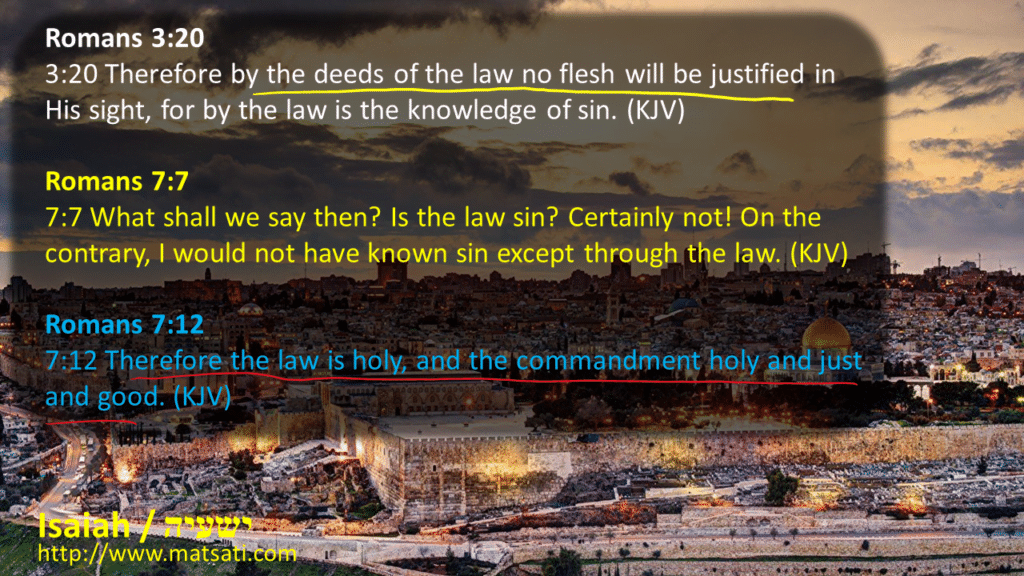
Romans 3:20
3:20 Therefore by the deeds of the law no flesh will be justified in His sight, for by the law is the knowledge of sin. (KJV)
Romans 7:7
7:7 What shall we say then? Is the law sin? Certainly not! On the contrary, I would not have known sin except through the law. (KJV)
Romans 7:12
7:12 Therefore the law is holy, and the commandment holy and just and good. (KJV)
This understanding is much more consistent with Paul’s exhortation according to 2 Timothy 3:16 All Scripture is given by inspiration of God, and is profitable for doctrine, for reproof, for correction, for instruction in righteousness.” (KJV) This yoke was in reference to a man earning his salvation before God which as we all know is impossible because we all sin! This understanding also reconciles Paul’s reproof of the Galatians who endeavored to be “Justified by the law,” with his upholding “What is written” as though it still stands to speak with authority to the gentiles as well. (1 Corinthians 1:19, 1:31, 2:9, 3:19, 9:9-10, 10:7, 14:21, 15:45, 2 Corinthians 8:15, 9:9, Galatians 3:10, 3:13, 4:22-27, etc). Also note that these things do not teach that we should not pursue righteousness and holiness in our lives. But that we rely purely upon the mercy of God, and it is by His great mercy that we are redeemed in His Son Yeshua. Tehillim / Psalms 19 provides us insight into why the Messiah will teach Torah to His people.
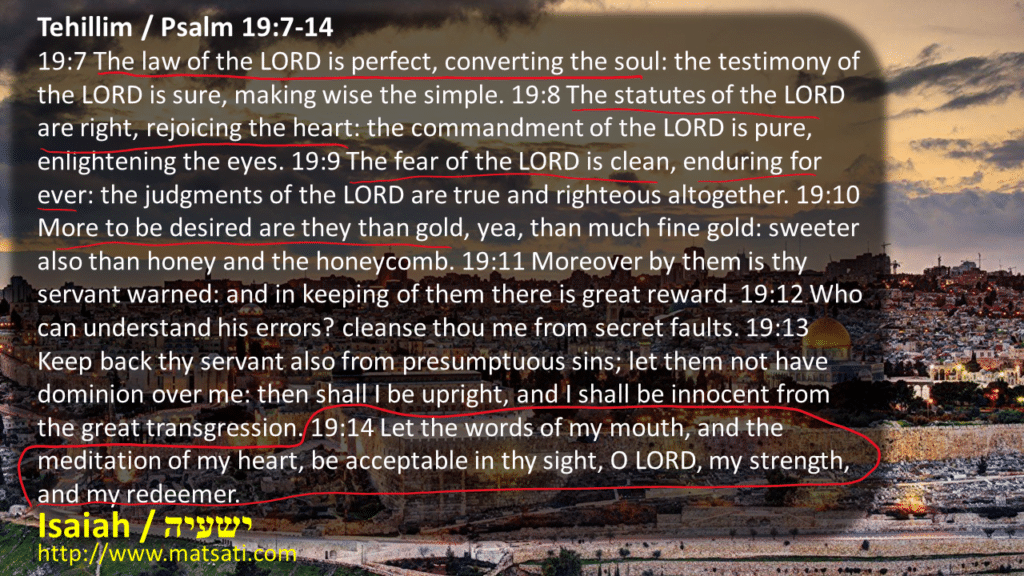
Tehillim / Psalm 19:7-14
19:7 The law of the LORD is perfect, converting the soul: the testimony of the LORD is sure, making wise the simple. 19:8 The statutes of the LORD are right, rejoicing the heart: the commandment of the LORD is pure, enlightening the eyes. 19:9 The fear of the LORD is clean, enduring for ever: the judgments of the LORD are true and righteous altogether. 19:10 More to be desired are they than gold, yea, than much fine gold: sweeter also than honey and the honeycomb. 19:11 Moreover by them is thy servant warned: and in keeping of them there is great reward. 19:12 Who can understand his errors? cleanse thou me from secret faults. 19:13 Keep back thy servant also from presumptuous sins; let them not have dominion over me: then shall I be upright, and I shall be innocent from the great transgression. 19:14 Let the words of my mouth, and the meditation of my heart, be acceptable in thy sight, O LORD, my strength, and my redeemer.
Notice how David states that the Torah is that which converts the soul, and for making wise, and for having understanding, and for being a delight, etc. These are significant points that are for the most part overlooked today. The purpose of the Torah again is in the life of the one who is walking according to the Spirit of God, as it is the Lord Himself who gives life, wisdom, understanding, and the power to overcome sin and walk in His holy and righteous ways! As Paul was trying to emphasize, our focus should be upon God working and living in and through us, not the other way around.
Isaiah states, וְאֵת מַטֵּה שִׁכְמוֹ שֵׁבֶט הַנֹּגֵשֹ בּוֹ הַחִתֹּתָ “and the staff of his shoulder, the rod of his oppressor,” indicating that the nations are who are placing a burden upon the people. These things reveal to us that God sent His Messiah to not just free us from bondage to sin, but also to free us from physical oppression as well. Note that there is a real Christian teaching that God is not concerned with or delivers us from physical oppression. This again is absolutely false and the result of not taking a Torah perspective! We cannot take a blind eye to the physical oppression that comes by the enemy, as the Lord God is equally interested in delivering His people from this as well. I have read Christian commentators saying that in the OT God was more concerned with physical things, blessing, wealth, and oppression, but in Jesus now He is not interested in that, we are only delivered from sin. This doctrine promotes a discontinuity in the biblical narrative. We note that true Shalom (peace) is not possible without God’s help. The purpose of the Messiah coming into this world was to lift the burden of sin off of our shoulders, and this then leads to Shalom to all men, to all those who believe. This then leads to freedom, both physical and spiritual. Yeshua lifts the yoke of sin in order to lift the yoke of oppression! The Church today has forgotten about this Torah centric truth to its detriment!
The statement כְּיוֹם מִדְיָן “in the day of Midian’‘ reminds us of the Torah narrative according to Parashat Pinchas. Remember Midean and Baal Peor, the sexual idolatrous sin of Israel. These things all tie together, of Yeshua setting us free from bondage to sexual sins as well! Isaiah alludes to these events in order to draw in the Torah context and the power of God to overcome anything in our lives, it does not matter what it is, God can overcome and deliver His people, and so we can trust in Him! Even to the moving of mountains by our faith! (Matthew 17:20, 21:21, Mark 11:23, Luke 17:6)
ספר ישעיה פרק ט
ד כִּ֤י כָל־סְאוֹן֙ סֹאֵ֣ן בְּרַ֔עַשׁ וְשִׂמְלָ֖ה מְגוֹלָלָ֣ה בְדָמִ֑ים וְהָיְתָ֥ה לִשְׂרֵפָ֖ה מַאֲכֹ֥לֶת אֵֽשׁ:
Isaiah 9:5 states, “For every battle of the warrior is with confused noise, and garments rolled in blood; (כִּי כָל-סְאוֹן סֹאֵן בְּרַעַשׁ וְשִֹמְלָה מְגוֹלָלָה בְדָמִים) but this shall be with burning and fuel of fire. (וְהָיְתָה לִשְֹרֵפָה מַאֲכֹלֶת אֵשׁ)” There seems to be a contrast here indicated by the atnakh under the word בְדָמִ֑ים creating a division in the verse separating the two conditions. One, a reference to the life of a warrior, whose garments are rolled in blood, whereas on the other hand, this will be by burning and consuming fire. There are two differing approaches; the first seems to be physical and the latter seems to be spiritual. This reminds us of Ephesians 6:12.
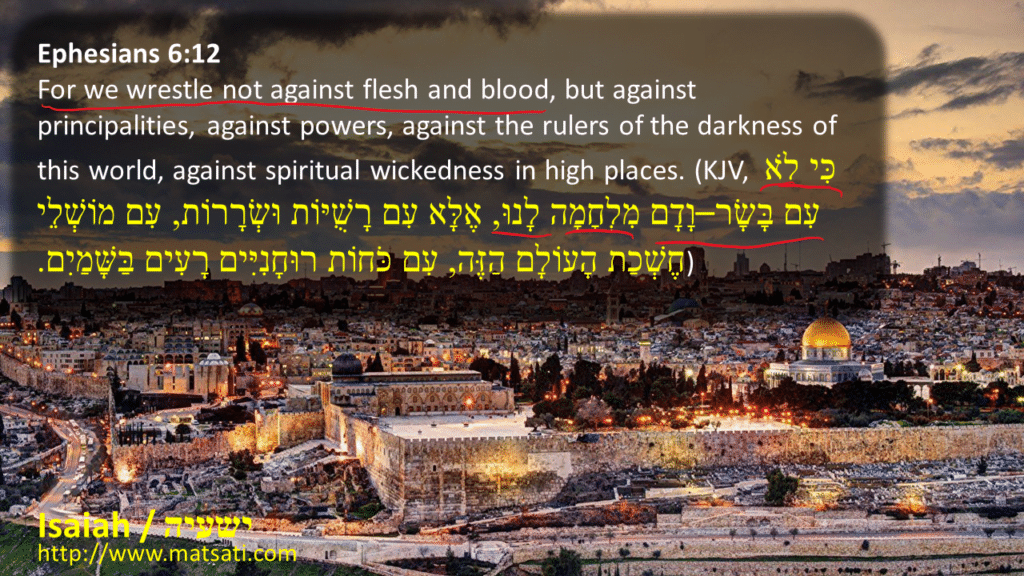
Ephesians 6:12
For we wrestle not against flesh and blood, but against principalities, against powers, against the rulers of the darkness of this world, against spiritual wickedness in high places. (KJV)
These things remind us of the power of God in our lives. The struggle that we have in this world is not just against flesh and blood, the source of the opposition is spiritual. This is why what we have in Yeshua is powerful to overcome both the physical and the spiritual powers of evil that we are up against in this world. This is the point of the Lord bringing the child king into this world as redeemer and savior.
ספר ישעיה פרק ט
ה כִּי-יֶלֶד יֻלַּד-לָנוּ בֵּן נִתַּן-לָנוּ וַתְּהִי הַמִּשְֹרָה עַל-שִׁכְמוֹ וַיִּקְרָא שְׁמוֹ פֶּלֶא יוֹעֵץ אֵל גִּבּוֹר אֲבִי-עַד שַֹר-שָׁלוֹם:
Isaiah 9:6 states, “For unto us a child is born, (כִּי-יֶלֶד יֻלַּד-לָנוּ) unto us a son is given: (בֵּן נִתַּן-לָנוּ) and the government shall be upon his shoulder: (וַתְּהִי הַמִּשְֹרָה עַל-שִׁכְמוֹ) and his name shall be called Wonderful, Counselor, The mighty God, The everlasting Father, The Prince of Peace. (וַיִּקְרָא שְׁמוֹ פֶּלֶא יוֹעֵץ אֵל גִּבּוֹר אֲבִי-עַד שַֹר-שָׁלוֹם)” Here in the opening words to this verse, the word ילד is repeated twice, the יֶלֶד means “child” and יֻלַּד is written in the Pual qatal perfect third person masculine singular form meaning “be born.” We can hear the blessing within the words כִּי-יֶלֶד יֻלַּד-לָנוּ בֵּן נִתַּן-לָנוּ “for unto us a child is born, unto us a son is given.” The parallel is to Isaiah 7:14, יד לָ֠כֵן יִתֵּ֨ן אֲדֹנָ֥י ה֛וּא לָכֶ֖ם א֑וֹת הִנֵּ֣ה הָעַלְמָ֗ה הָרָה֙ וְיֹלֶ֣דֶת בֵּ֔ן וְקָרָ֥את שְׁמ֖וֹ עִמָּ֥נוּ אֵֽל Therefore the Lord Himself will give you a sign: Behold, the virgin shall conceive and bear a Son, and shall call His name Immanuel. (KJV) There is joy when a child is born, especially when that child is spoken of prophetically as the coming messiah. Again, we see a name change, as compared to Isaiah 7:14 and 8:3, here Isaiah says, וַיִּקְרָא שְׁמוֹ פֶּלֶא יוֹעֵץ אֵל גִּבּוֹר אֲבִי-עַד שַֹר-שָׁלוֹם “and his name shall be called Wonderful, Counselor, The mighty God, The everlasting Father, The Prince of Peace.” Some, but not all, Hebrew names stem from strong or otherwise exemplary characters in the Bible. Hebrew names are often based on words that represent character attributes, such as “pleasant” or “joyous.” Others are meant to exemplify the power of God that will be worked in the life of the child. Here the child will not necessarily being named these things, but these things demonstrate the power of עִמָּ֥נוּ אֵֽל “God with us” being called Wonderful (פֶּלֶא), Counselor (יוֹעֵץ), The mighty God (אֵל גִּבּוֹר), The everlasting Father (אֲבִי-עַד), The Prince of Peace (שַֹר-שָׁלוֹם). These things are descriptive of the one who is meant to bring freedom on earth, one who will have true faith and innocence before God as a child loves and trusts his parents. This child that will be born will rule and deliver His people. The question then is how will this child deliver the people from arrogance, pride, war, oppression, and even depression? Not by becoming like these things, but by humility, and trusting in the Lord God of Israel who is able to overcome the enemy and effect men and women from the inside out, at the heart and spiritual level. These names given to the child are representative of what God will do through this new king who is a representative of God. These names are an expression of faith and belief of what God is going to do through the child and directs us back to Isaiah 7:14 עִמָּ֥נוּ אֵֽל “God with us” of the Lord God dwelling in our midst and in the midst of this child’s kingdom. Ultimately the child will demonstrate to us that God is with us. The attribute “everlasting Father” (אֲבִי-עַד) the fatherhood of this child will be eternal, suggesting something of this child, of faith and birth, which tends to connect back to the John 3 account of being born new through faith. It may be that through the son that is born, we will see the fatherhood of God in heaven which will endure forever, and of the resurrection of the Messianic king being spoken of here as we see written of in the NT text. (Matthew 6:25-26, 11:27-30, 18:12-14, 23:9-12, Luke 23:34, Romans 8:15-17) The phrase שַֹר-שָׁלוֹם “prince of peace” is indicative of the Messiah bringing peace to the people, a peace that will surpass understanding, and make peace among men. This sort of peace is the kind that is between brothers who love each other, and the establishment of mercy. (see Isaiah 53:5, 57:19, 66:12, Luke 2:14, John 16:33, Romans 5:1, Hebrews 12:14)
ספר ישעיה פרק ט
ו לְםַרְבֵּה [לְמַרְבֵּה] הַמִּשְֹרָה וּלְשָׁלוֹם אֵין-קֵץ עַל-כִּסֵּא דָוִד וְעַל-מַמְלַכְתּוֹ לְהָכִין אֹתָהּ וּלְסַעֲדָהּ בְּמִשְׁפָּט וּבִצְדָקָה מֵעַתָּה וְעַד-עוֹלָם קִנְאַת יְהֹוָה צְבָאוֹת תַּעֲשֶֹה-זֹּאת:
Isaiah 9:7 states, “Of the increase of his government and peace there shall be no end, (לְםַרְבֵּה [לְמַרְבֵּה] הַמִּשְֹרָה וּלְשָׁלוֹם אֵין-קֵץ) upon the throne of David, and upon his kingdom, (עַל-כִּסֵּא דָוִד וְעַל-מַמְלַכְתּוֹ) to order it, and to establish it with judgment and with justice from henceforth even for ever. (לְהָכִין אֹתָהּ וּלְסַעֲדָהּ בְּמִשְׁפָּט וּבִצְדָקָה מֵעַתָּה וְעַד-עוֹלָם) The zeal of the LORD of hosts will perform this. (קִנְאַת יְהֹוָה צְבָאוֹת תַּעֲשֶֹה-זֹּאת)” This idea לְםַרְבֵּה [לְמַרְבֵּה] הַמִּשְֹרָה וּלְשָׁלוֹם אֵין-קֵץ that the increase of his dominion shall have no end, is an indication of his every increasing kingdom, reminiscent of His people be incorporated through changing faith which is connected to the throne of David and his kingdom, in fulfillment of the promises of God. The difference between this kingdom and the previous ones is that it will be established upon a foundation of בְּמִשְׁפָּט וּבִצְדָקָה “judgment and justice” forever (וְעַד-עוֹלָם). Note that the Lord God has not done away with the ancient promise to David. This promise continues through those who have faith in Yeshua the Messiah. Note also the difference in this child king, that His kingdom will not be established by more violence, but in justice and truth. This is unique in the way in which the throne of David will be established! קִנְאַת יְהֹוָה צְבָאוֹת תַּעֲשֶֹה-זֹּאת “the zeal of the LORD of hosts will perform this” denotes how this child king will be fully given to the ways of God, to lead His people, and directing us to recognize that it is the Lord God Almighty who is working salvation for His people.
ספר ישעיה פרק ט
ז דָּבָר שָׁלַח אֲדֹנָי בְּיַעֲקֹב וְנָפַל בְּיִשְֹרָאֵל:
Isaiah 9:8 states, “The Lord sent a word into Jacob, (דָּבָר שָׁלַח אֲדֹנָי בְּיַעֲקֹב) and it hath lighted upon Israel. (וְנָפַל בְּיִשְֹרָאֵל)” Here Isaiah speaks of the word of God being sent and falling upon (וְנָפַל) Israel. This draws us back to Isaiah’s words to Ahaz who trusted in Assyria. The Lord is the one who is bringing these things for the purpose of repentance, and judgment to those who refuse to repent. Note that what is given to Ephraim (i.e. the reference to Jacob) these truths belong to all of Israel, including Judah and Jerusalem. The Lord God is looking for the same standard for all of His people, to turn from their sinful ways, to seek Him in His holy Word, and to believe in the One who is able to save them! (i.e. the Messiah) The general theme that we have been reading about in regard to pride and arrogance, the coming Messiah is directing us to humble our hearts to seek the Lord and walk in the footsteps of the Messiah. Therefore, Isaiah reminds the people of their evil ways, to demonstrate that the eternal measuring rod is that of the Torah of God. Walking away from God’s Torah will lead to certain destruction!
ספר ישעיה פרק ט
ח וְיָדְעוּ הָעָם כֻּלּוֹ אֶפְרַיִם וְיוֹשֵׁב שֹׁמְרוֹן בְּגַאֲוָה וּבְגֹדֶל לֵבָב לֵאמֹר:
Isaiah 9:9 states, “And all the people shall know, (וְיָדְעוּ הָעָם כֻּלּוֹ) even Ephraim and the inhabitant of Samaria, (אֶפְרַיִם וְיוֹשֵׁב שֹׁמְרוֹן) that say in the pride and stoutness of heart, (בְּגַאֲוָה וּבְגֹדֶל לֵבָב לֵאמֹר)” Here is the pride that leads to destruction. In the midst of their pride, the people are unwilling to admit it was due to their sins that have led to all of these events of destruction. The day will come however that will make one recognize (admit) that God is holy and righteous, and they are the ones who have limited the blessing of God due to their sin. The Psalmist wrote “the life of every living thing is in His hand, as well as the breath of all mankind.” (Tehillim / Psalm 119:109) Therefore the conclusion is that God is always involved, no matter what happens. This is how Paul could write according to Romans 8:28, “For God works all things together for good to those who love him and are called according to his purpose.”
ספר ישעיה פרק ט
ט לְבֵנִים נָפָלוּ וְגָזִית נִבְנֶה שִׁקְמִים גֻּדָּעוּ וַאֲרָזִים נַחֲלִיף:
Isaiah 9:10 states, “The bricks are fallen down, (לְבֵנִים נָפָלוּ) but we will build with hewn stones: (וְגָזִית נִבְנֶה) the sycamores are cut down, (שִׁקְמִים גֻּדָּעוּ) but we will change them into cedars. (וַאֲרָזִים נַחֲלִיף)” Here we read a word concerning changing what was old, the destruction of what was previous, and the rebuilding with something new. But in this case, the idea of וְגָזִית נִבְנֶה “build with hewn stones” reminds us of the Torah according to Parashat Yitro, of building an altar with hewn stones, something that is forbidden. The idea is making an altar after one’s own imagination. The rebuilding should not be made after our image, but by God’s creative hand. This is why the concept of being born new (John 3) is so essential for us to understand, as God works in our lives to change us from the inside out.
ספר ישעיה פרק ט
י וַיְשַֹגֵּב יְהֹוָה אֶת-צָרֵי רְצִין עָלָיו וְאֶת-אֹיְבָיו יְסַכְסֵךְ:
Isaiah 9:11 states, “Therefore the LORD shall set up the adversaries of Rezin (וַיְשַֹגֵּב יְהֹוָה אֶת-צָרֵי רְצִין) against him, and join his enemies together; (עָלָיו וְאֶת-אֹיְבָיו יְסַכְסֵךְ)” These words speak to the judgment of the nation, God is bringing another nation to execute judgment. We note that throughout the history of Israel, the righteous king, the one who did what was right in the eyes of the Lord, the Lord would move in the hearts of the kings of foreign nations to stay away and even to be in peace. These things reveal to us when we are not seeking the Lord, the adversary will arise to take advantage. When we do seek the Lord, the adversary will not arise. Note how these are Torah centric principles. Note also how today these principles are ignored believing that all of these things are done away with in the Messiah Yeshua. The fact of the matter is, when pride reigns, it is then that one is near a fall. If unrepentance continues, a devourer will be lifted up to consume the hapless people who are confident in themselves as opposed to trusting in the Lord God in heaven and in His Messiah Yeshua. These Torah based truths remain as they are spoken of in the NT text. (See the epistles)
Rabbinic Literature on Isaiah 9:1-10
The Targum Jonathan is a rabbinic interpretation of the book of Isaiah. TgJ has the following to say concerning Isaiah 9:1-10.
תרגום יונתן בן עוזיאל אל ישעיה פרק ט:א-י
א עַמָא בֵית יִשׂרָאֵל דַהְווֹ מְהַלְכִין בְמִצרַיִם כִיד בְקַבלָא נְפַקוּ לְמִחזֵי נֵיהֹור סַגִי יָתְבִין בַאְרַע טוּלֵי מֹותָא נְהֹורָא אַזהַר עְלֵיהֹון׃ ב אַסגִיתָא עַמָא בֵית יִשׂרָאֵל לְהֹון אַסגִיתָא חַדוָא חְדִיאוּ קֳדָמָך כְחַדוַת נָצְחֵי קְרָב כְמָא דַהְווֹ חָדַן בְפַלָגוּתְהֹון בִיזְתָא׃ ג אְרֵי אַעדִיתָא יָת נִיר מַרוְתֵיה וְיָת שוּלטַן עָקְתֵיה שִלטֹון דַהְוָה מַפלַח בֵיה אִיתְבַר כְיֹום מִדיָן׃ ד אְרֵי כָל מִיסַבהֹון וּמִיתַנהֹון בִרשַע אִתגָעַלוּ בְחֹובִין הָא כִכסוּ דִמלַושָא בְדַם דְלָא דָכַן רִשמֵי כִתמַה מִינַה כֵין כְמָא דְלֵית בַה צְרֹוך אְלָהֵין לְאִתֹוקָדָא בְנוּרָא כֵין יֵיתֹון עְלֵיהֹון עַמְמַיָא דְתַקִיפִין כְאִישָתָא וְיִקטְלוּנוּנוּן ה אְמַר נְבִיָא לְבֵית דָוִיד אְרֵי רָבֵי אִתיְלֵיד לַנָא בַר אִתיְהֵיב לַנָא וְקַבֵיל אֹורָיתָא עְלֹוהִי לְמִיטְרַה וְאִתקְרִי שְמֵיה מִן קֳדָם מַפלִי עֵיצָא אְלָהָא גִיבָרָא קַייָם עָלְמַיָא מְשִיחָא דִשלָמָא יִסגֵי עְלַנָא בְיֹומֹוהִי׃ ו סַגִי רְבוּ לעָבְדֵי אֹורָיתָא וּלנָטְרֵי שְלָמָא לֵית סֹוף עַל כוּרסֵי דָוִיד וְעַל מַלכוּתֵיה לְאַתקָנָא יָתַה וּלמִבנַה בְדִינָא וּבזָכוּתָא מִכְעַן וְעַד עָלְמָא בְמֵימְרָא דַיוי צְבָאֹות תִתעְבֵיד דָא׃ ז פִתגָמָא שְלַח יוי בִדבֵית יַעְקֹב וְאִשתְמַע בְיִשׂרָאֵל ח וְאִתרָרַבוּ עַמָא הָדֵין כוּלְהֹון אַפרַיִם וְיָתֵיב שֹמְרֹון בִרבוּ וּבִתקֹוף לֵב לְמֵימַר׃ ט רָשַיָא גְלֹו וּדטָבִין מִנְהֹון נְמַנֵי נִכסַיָא אִתבְזִיזוּ וּדשַפִירִין מִנְהֹון נִקנֵי׃ י וְתַקֵיף יוי יָת סָנְאֵיה דְיִשׂרָאֵל רְצִין עְלֹוהִי וְיָת בַעְלֵי דְבָבֹוהִי יְעָרַר׃
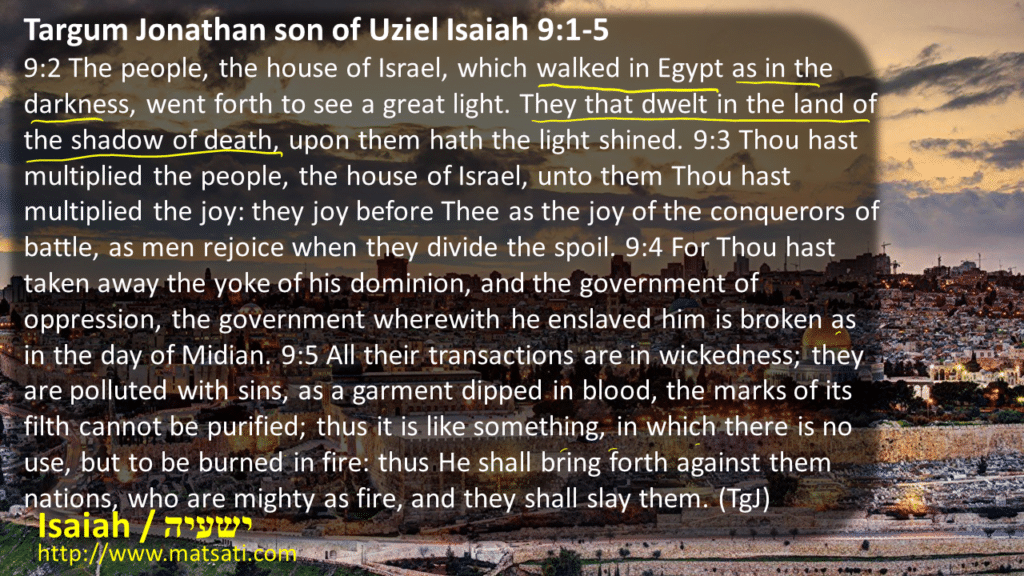
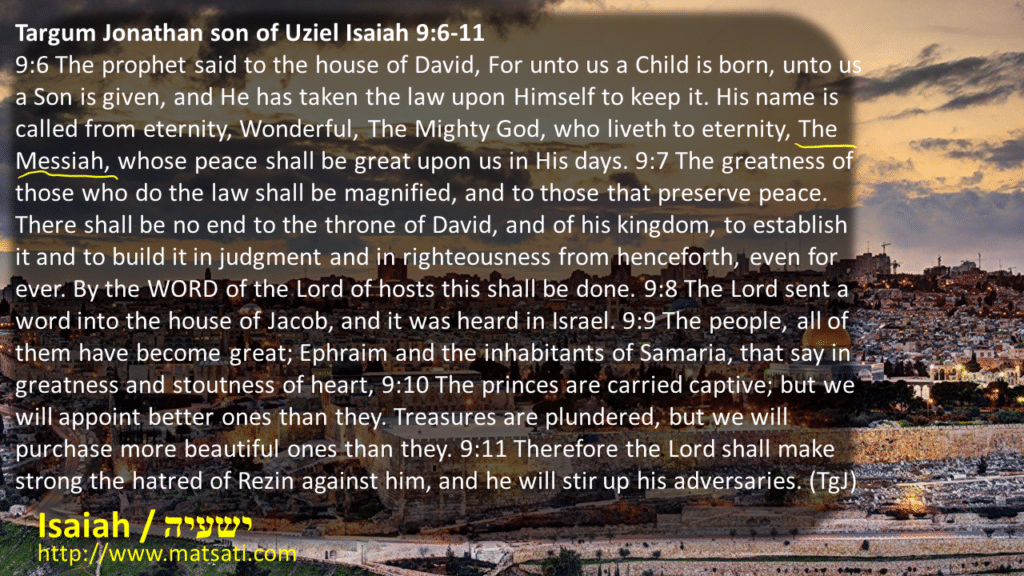
Targum Jonathan son of Uziel Isaiah 9:1-10
9:2 The people, the house of Israel, which walked in Egypt as in the darkness, went forth to see a great light. They that dwelt in the land of the shadow of death, upon them hath the light shined. 9:3 Thou hast multiplied the people, the house of Israel, unto them Thou hast multiplied the joy: they joy before Thee as the joy of the conquerors of battle, as men rejoice when they divide the spoil. 9:4 For Thou hast taken away the yoke of his dominion, and the government of oppression, the government wherewith he enslaved him is broken as in the day of Midian. 9:5 All their transactions are in wickedness; they are polluted with sins, as a garment dipped in blood, the marks of its filth cannot be purified; thus it is like something, in which there is no use, but to be burned in fire: thus He shall bring forth against them nations, who are mighty as fire, and they shall slay them. 9:6 The prophet said to the house of David, For unto us a Child is born, unto us a Son is given, and He has taken the law upon Himself to keep it. His name is called from eternity, Wonderful, The Mighty God, who liveth to eternity, The Messiah, whose peace shall be great upon us in His days. 9:7 The greatness of those who do the law shall be magnified, and to those that preserve peace. There shall be no end to the throne of David, and of his kingdom, to establish it and to build it in judgment and in righteousness from henceforth, even for ever. By the WORD of the Lord of hosts this shall be done. 9:8 The Lord sent a word into the house of Jacob, and it was heard in Israel. 9:9 The people, all of them have become great; Ephraim and the inhabitants of Samaria, that say in greatness and stoutness of heart, 9:10 The princes are carried captive; but we will appoint better ones than they. Treasures are plundered, but we will purchase more beautiful ones than they. 9:11 Therefore the Lord shall make strong the hatred of Rezin against him, and he will stir up his adversaries. (TgJ)
TgJ opens the translation of Isaiah chapter 9 saying “the people, the house of Israel which walked in Egypt as in the darkness,” this draws in the Torah context, of the Pesach (Passover, פסח), and Shavuot (שבועות) and the powerful deliverance of the people of Israel from the land of bondage. Note how their “seeing a great light” (לְמִחזֵי נֵיהֹור סַגִי) this is the Lord’s deliverance. Remember the purpose of God sending Moshe to Israel was to be a deliverer, to lead the people out of the land of slavery, and to freedom, peace, and life in the Lord God of Israel. The 50-day journey from Passover to Shavuot (Pentecost) when the people arrived at the mountain of Sinai and received God’s holy word. Moshe then ascended the mountain and God gave Him the Torah. Moshe returned and spoke to the people, that if they keep God’s commands, they will be a kingdom of priests and a holy nation. (Shemot / Exodus 19:6, וְאַתֶּ֧ם תִּהְיוּ־לִ֛י מַמְלֶ֥כֶת כֹּהֲנִ֖ים וְג֣וֹי קָד֑וֹשׁ אֵ֚לֶּה הַדְּבָרִ֔ים אֲשֶׁ֥ר תְּדַבֵּ֖ר אֶל־בְּנֵ֥י יִשְׂרָאֵֽל) It is here that the people responded by proclaiming “kol asher diber Adonai naaseh” וַיַּעֲנ֨וּ כָל־הָעָ֤ם יַחְדָּו֙ וַיֹּ֣אמְר֔וּ כֹּ֛ל אֲשֶׁר־דִּבֶּ֥ר יְהוָ֖ה נַעֲשֶׂ֑ה וַיָּ֧שֶׁב מֹשֶׁ֛ה אֶת־דִּבְרֵ֥י הָעָ֖ם אֶל־יְהוָֽה׃ (Shemot / Exodus 16:8, “all that the Lord has spoken we will do”). The end goal of the Torah is to direct us to the Messiah of God, as God had revealed to Israel a great light to the nation through Moshe, he does so through the delivering power of God through His Messiah. This is why Paul wrote saying the end goal of the Torah is the Messiah (Romans 10:4). The second goal of the Torah is what we read according to Jeremiah 31:33 נָתַ֤תִּי אֶת־תּֽוֹרָתִי֙ בְּקִרְבָּ֔ם וְעַל־לִבָּ֖ם אֶכְתֲּבֶ֑נָּה “I will give my Torah in their midst and write it upon their hearts.” The great light of God is the revelation of His truth, His salvation, His deliverance, and His mercy to His people. This is a much-needed truth, to study God’s Word in the Scriptures which foretell of these things and give us hope and trust in the Lord! Midrash Tanchuma draws out an interesting observation about the Mishnah and Isaiah 9.1 saying the following:
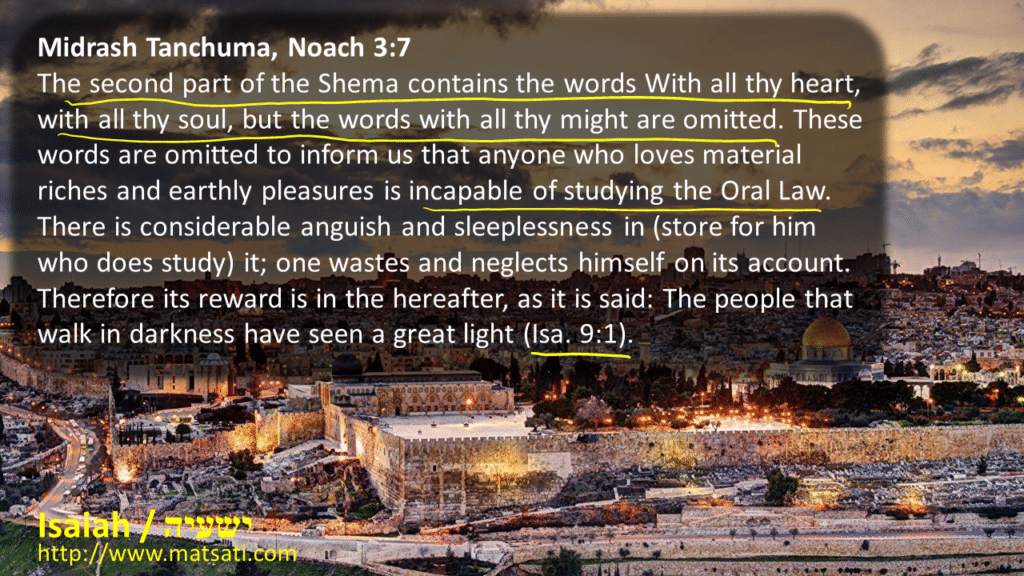
Midrash Tanchuma, Noach 3:7
The second part of the Shema contains the words With all thy heart, with all thy soul, but the words with all thy might are omitted. These words are omitted to inform us that anyone who loves material riches and earthly pleasures is incapable of studying the Oral Law. There is considerable anguish and sleeplessness in (store for him who does study) it; one wastes and neglects himself on its account. Therefore its reward is in the hereafter, as it is said: The people that walk in darkness have seen a great light (Isa. 9:1).
The Mishnah (Oral Law) is an authoritative collection of exegetical material embodying the oral tradition of the Torah. The Oral Law (Mishnah) was never written down in a formalized text or permanent record until the defeat of Bar Kochba. The Rabbis previously had passed down the oral tradition through memorization, but after the destruction of the Second Temple in Jerusalem, it became a necessity in order to preserve the tradition. Here Midrash Tanchuma notes a connection between Isaiah 9:1 to the Oral Tradition. Specifically, those who walk in darkness are unable to study the Oral Law. The reason this is so significant is that the Mishnah contains the details on how to apply the Torah to one’s life. The rabbis conclude that anyone who loves material riches and earthly pleasures is incapable of applying God’s word to their Lives. The reason being, repentance and humbleness before God are required for drawing near to the Lord, even for hearing the Lord speak through His Holy Word.
Isaiah continues saying according to TgJ, ב אַסגִיתָא עַמָא בֵית יִשׂרָאֵל לְהֹון אַסגִיתָא חַדוָא חְדִיאוּ קֳדָמָך כְחַדוַת נָצְחֵי קְרָב כְמָא דַהְווֹ חָדַן בְפַלָגוּתְהֹון בִיזְתָא׃ 9:3 Thou hast multiplied the people, the house of Israel, unto them Thou hast multiplied the joy: they joy before Thee as the joy of the conquerors of battle, as men rejoice when they divide the spoil. ג אְרֵי אַעדִיתָא יָת נִיר מַרוְתֵיה וְיָת שוּלטַן עָקְתֵיה שִלטֹון דַהְוָה מַפלַח בֵיה אִיתְבַר כְיֹום מִדיָן׃ 9:4 For Thou hast taken away the yoke of his dominion, and the government of oppression, the government wherewith he enslaved him is broken as in the day of Midian. ד אְרֵי כָל מִיסַבהֹון וּמִיתַנהֹון בִרשַע אִתגָעַלוּ בְחֹובִין הָא כִכסוּ דִמלַושָא בְדַם דְלָא דָכַן רִשמֵי כִתמַה מִינַה כֵין כְמָא דְלֵית בַה צְרֹוך אְלָהֵין לְאִתֹוקָדָא בְנוּרָא כֵין יֵיתֹון עְלֵיהֹון עַמְמַיָא דְתַקִיפִין כְאִישָתָא וְיִקטְלוּנוּנוּן 9:5 All their transactions are in wickedness; they are polluted with sins, as a garment dipped in blood, the marks of its filth cannot be purified; thus it is like something, in which there is no use, but to be burned in fire: thus He shall bring forth against them nations, who are mighty as fire, and they shall slay them. ה אְמַר נְבִיָא לְבֵית דָוִיד אְרֵי רָבֵי אִתיְלֵיד לַנָא בַר אִתיְהֵיב לַנָא וְקַבֵיל אֹורָיתָא עְלֹוהִי לְמִיטְרַה וְאִתקְרִי שְמֵיה מִן קֳדָם מַפלִי עֵיצָא אְלָהָא גִיבָרָא קַייָם עָלְמַיָא מְשִיחָא דִשלָמָא יִסגֵי עְלַנָא בְיֹומֹוהִי׃ 9:6 The prophet said to the house of David, For unto us a Child is born, unto us a Son is given, and He has taken the law upon Himself to keep it. His name is called from eternity, Wonderful, The Mighty God, who liveth to eternity, The Messiah, whose peace shall be great upon us in His days. (TgJ) Something to note about what we are studying here; it is God’s will to deliver people from oppression and the harmful conditions of life. The Lord God Almighty works miracles to rescue people from physical danger, to move in the hearts of men in relation to political solutions, or to heal people of their psycho-emotional trauma. The Lord works on an individual level, but also on whole societies and classes of people, and even entire armies, as the Scriptures provide multiple examples of this. The Lord also wants to build community, relationships, and peace. This was the point of Paul’s exhortation of the Corinthians when he said according to 2 Corinthians 5:16-20, “through Christ, God has reconciled us to himself and thus given us the message and ministry of reconciliation” which speak to our being at peace with others, and not being a prideful or arrogant people as Isaiah described according to Isaiah 1-5. The point is that the Lord God Almighty did not deliver his people so they could live however they pleased, nor did he deliver them so they could be isolated individuals. We note that this was true back then, and this remains true even in Yeshua the Messiah today! The Lord God intends to create a qualitatively different kind of community in which his people would live with him and one another in covenant faithfulness. These things the Lord does are meant to strengthen the devotion of the people to God and His Word. The rabbis draw this concept out in the Torah concerning the Messiah according to the Talmud Bavli Sanhedrin 94a.
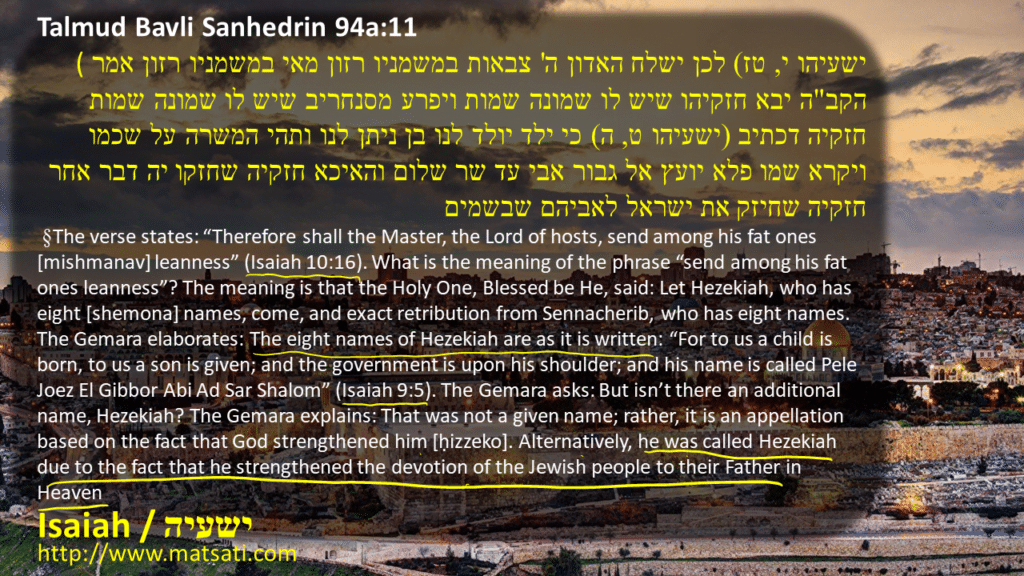
Talmud Bavli Sanhedrin 94a:11
(ישעיהו י, טז) לכן ישלח האדון ה’ צבאות במשמניו רזון מאי במשמניו רזון אמר הקב”ה יבא חזקיהו שיש לו שמונה שמות ויפרע מסנחריב שיש לו שמונה שמות חזקיה דכתיב (ישעיהו ט, ה) כי ילד יולד לנו בן ניתן לנו ותהי המשרה על שכמו ויקרא שמו פלא יועץ אל גבור אבי עד שר שלום והאיכא חזקיה שחזקו יה דבר אחר חזקיה שחיזק את ישראל לאביהם שבשמים
§ The verse states: “Therefore shall the Master, the Lord of hosts, send among his fat ones [mishmanav] leanness” (Isaiah 10:16). What is the meaning of the phrase “send among his fat ones leanness”? The meaning is that the Holy One, Blessed be He, said: Let Hezekiah, who has eight [shemona] names, come, and exact retribution from Sennacherib, who has eight names. The Gemara elaborates: The eight names of Hezekiah are as it is written: “For to us a child is born, to us a son is given; and the government is upon his shoulder; and his name is called Pele Joez El Gibbor Abi Ad Sar Shalom” (Isaiah 9:5). The Gemara asks: But isn’t there an additional name, Hezekiah? The Gemara explains: That was not a given name; rather, it is an appellation based on the fact that God strengthened him [ḥizzeko]. Alternatively, he was called Hezekiah due to the fact that he strengthened the devotion of the Jewish people to their Father in Heave.
In the various discussions of the rabbis found in the Talmud, we read about what exactly it is that rabbis are looking for in the coming Messiah. Here the rabbis speak of Hezekiah who functions as a messianic figure for the people of Israel in this time period. The attributes are characteristic of the messianic expectation, the description of the child king according to Isaiah 9:5 “For unto us a child is born, (כִּי-יֶלֶד יֻלַּד-לָנוּ) unto us a son is given: (בֵּן נִתַּן-לָנוּ) and the government shall be upon his shoulder: (וַתְּהִי הַמִּשְֹרָה עַל-שִׁכְמוֹ) and his name shall be called Wonderful, Counselor, The mighty God, The everlasting Father, The Prince of Peace. (וַיִּקְרָא שְׁמוֹ פֶּלֶא יוֹעֵץ אֵל גִּבּוֹר אֲבִי-עַד שַֹר-שָׁלוֹם)” The rabbis speak of the eight names each are in reference to something only the Lord God Almighty can do in the life of the Messiah. The ultimate outcome of the one who leads and guides the people is to strengthen their devotion to their Father in Heaven.
In the commentary Ohev Yisrael, Pinchas 2:1, the rabbis draw in kabbalistic concepts to understand Isaiah. We note that the kabbalistic tree of life is used to illustrate the connections of all of these things, salvation (in reference to Isaiah 12:3), the origin of salvation as connected to grace, compassion, wisdom (Chochmah), and understanding (Binah). The salvation of God is illustrated in the five salvations, which is connected to the Passover and the cups of wine, these things which Yeshua illustrated as the covenant that is made in blood. This is also connected to the tzadik, the life of a righteous one who lives and orders his life according to God’s Word. The Joy of the Lord is connected to this salvation, righteousness, and holiness, which are connected then to the daughters of Zelophehad (Bamidbar / Numbers 27:1-11), a story in the Torah concerning receiving the inheritance of God. The name Zelophechad is divided into two words, zel pachad “shadow of fear” and speaks of the strength of God that is given which are Fear and Awe, to those who have faith in him as opposed to those who hate Israel and do evil. The five salvations are paralleled to the cups of the Passover which brings salvation and redemption in messianic times. The rabbinic commentary states, “Blessed be the Name and what is left of the letters of Shema is SH”M, and from Echa”d, A”CH; so we can make the combination ASHMA”CH (which is Shem Ach due to our witnessing of the unity of the Holy Blessed One, and this is Ben Gil”ad, that it becomes revealed to us the Name A”ch brother/ an idea of God as Brother, through the E”D written augmented.) Ben Machir – Ben Machir with patach – that he will recognize and know and reveal and publicize the Holy One of Blessing to Israel. And as it is written “For a child has been born to us, a son has been given us. And authority has settled on his shoulders…in token of abundant authority and of peace without limit” (Isaiah 9:5-6).” Note how Isaiah 9:5-6 is said to draw in the revelation of God being a brother, of God being with us, Emmanuel. A very important observation that is to be made here concerning the rabbinic literature, is the connection of all these concepts to the King Messiah. These concepts are all also drawn out in one way or another in the NT concerning Yeshua the Messiah! Just as we have shown in past weeks concerning Isaiah 7 and 8, the rabbinic literature does not contradict the Apostolic Writings. When we look at what the rabbis say concerning the Messiah, their concepts and discussions actually strengthen the NT account of Yeshua and everything that is taught about Him being the Messiah of God! An example in point may be taken from the Jewish responsa Iggerot HaRambam, Iggeret Teiman 13.
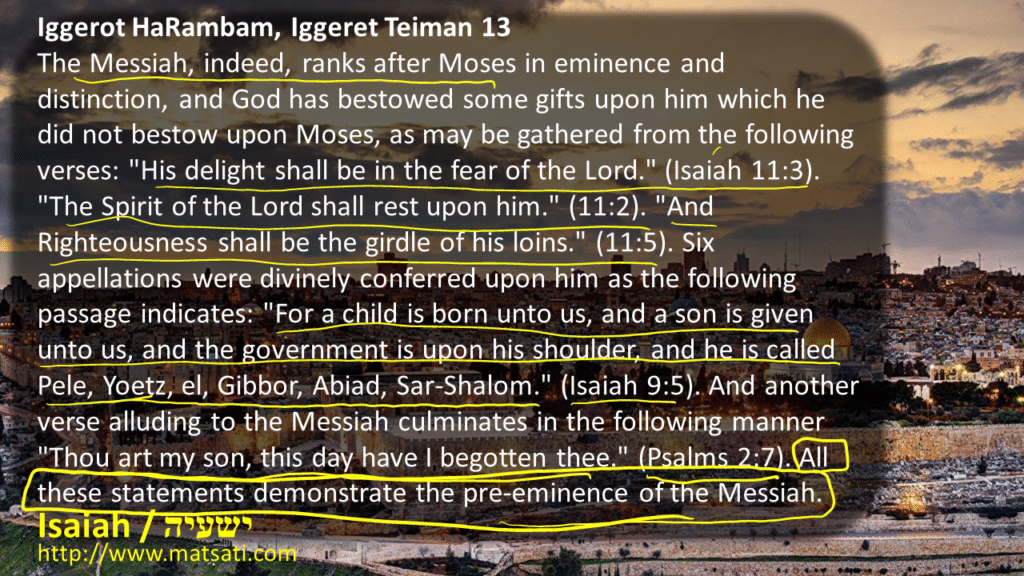
Iggerot HaRambam, Iggeret Teiman 13
The Messiah, indeed, ranks after Moses in eminence and distinction, and God has bestowed some gifts upon him which he did not bestow upon Moses, as may be gathered from the following verses: “His delight shall be in the fear of the Lord.” (Isaiah 11:3). “The Spirit of the Lord shall rest upon him.” (11:2). “And Righteousness shall be the girdle of his loins.” (11:5). Six appellations were divinely conferred upon him as the following passage indicates: “For a child is born unto us, and a son is given unto us, and the government is upon his shoulder, and he is called Pele, Yoetz, el, Gibbor, Abiad, Sar-Shalom.” (Isaiah 9:5). And another verse alluding to the Messiah culminates in the following manner “Thou art my son, this day have I begotten thee.” (Psalms 2:7). All these statements demonstrate the pre-eminence of the Messiah.
The point of this responsa, is that all of the verses that are used as support text for the Messianic King, are the same as what are given as proofs according to the NT authors. The rabbinic literature does not create an opposing view to the NT witness of Yeshua. The rabbis reveal the underlying spiritual and scriptural principles for the Promised One of God, the Messiah!
Isaiah continues saying according to the TgJ, ו סַגִי רְבוּ לעָבְדֵי אֹורָיתָא וּלנָטְרֵי שְלָמָא לֵית סֹוף עַל כוּרסֵי דָוִיד וְעַל מַלכוּתֵיה לְאַתקָנָא יָתַה וּלמִבנַה בְדִינָא וּבזָכוּתָא מִכְעַן וְעַד עָלְמָא בְמֵימְרָא דַיוי צְבָאֹות תִתעְבֵיד דָא׃ 9:7 The greatness of those who do the law shall be magnified, and to those, that preserve peace. There shall be no end to the throne of David, and of his kingdom, to establish it and to build it in judgment and in righteousness from henceforth, even for ever. By the WORD of the Lord of hosts this shall be done. (TgJ) Note the parallel the TgJ makes between those who obey God’s Word and those who preserve peace. (i.e. Matthew 5:9) The power of God is revealed in the establishment of the throne of David through the Messiah, and this comes true through the foundation of God’s Word! This reminds us of Isaiah 55:11, כֵּ֣ן יִֽהְיֶ֤ה דְבָרִי֙ אֲשֶׁ֣ר יֵצֵ֣א מִפִּ֔י לֹֽא־יָשׁ֥וּב אֵלַ֖י רֵיקָ֑ם כִּ֤י אִם־עָשָׂה֙ אֶת־אֲשֶׁ֣ר חָפַ֔צְתִּי וְהִצְלִ֖יחַ אֲשֶׁ֥ר שְׁלַחְתִּֽיו׃ “So shall my word be that goeth forth out of my mouth: it shall not return unto me void, but it shall accomplish that which I please, and it shall prosper in the thing whereto I sent it.” (KJV) Rashi states the following concerning this verse.
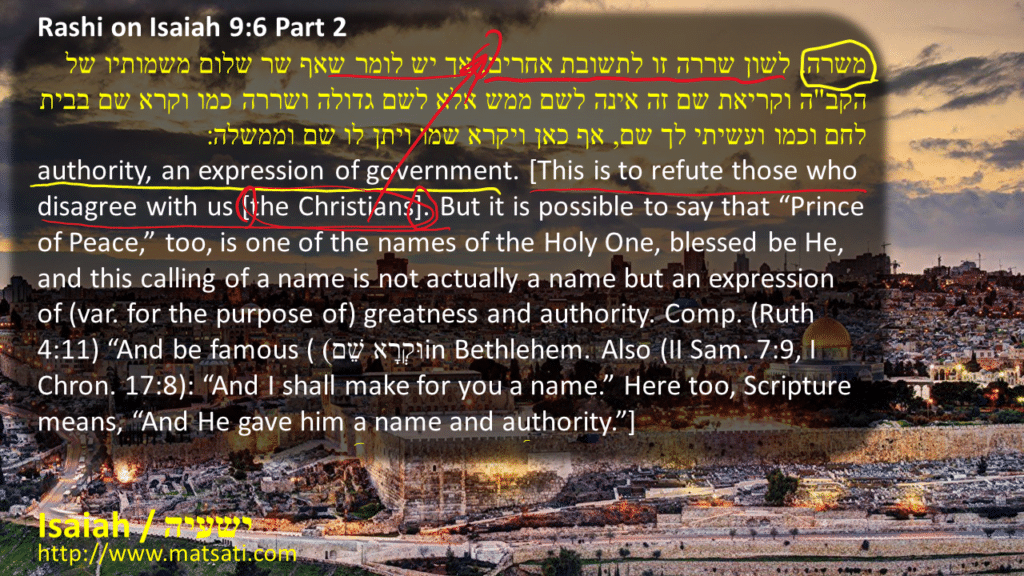
Rashi on Isaiah 9:6 Part 2
משרה. לשון שררה זו לתשובת אחרים, אך יש לומר שאף שר שלום משמותיו של הקב”ה וקריאת שם זה אינה לשם ממש אלא לשם גדולה ושררה כמו וקרא שם בבית לחם וכמו ועשיתי לך שם, אף כאן ויקרא שמו ויתן לו שם וממשלה:
authority, an expression of government. This is to refute those who disagree with us [the Christians]. But it is possible to say that “Prince of Peace,” too, is one of the names of the Holy One, blessed be He, and this calling of a name is not actually a name but an expression of (var. for the purpose of) greatness and authority. Comp. (Ruth 4:11) “And be famous (וּקְרָא שֵׁם) in Bethlehem. Also (II Sam. 7:9, I Chron. 17:8): “And I shall make for you a name.” Here too, Scripture means, “And He gave him a name and authority.”
The focus of Rashi’s comments is on the word הַמִּשְׂרָ֜ה “authority” saying that this is an expression of government, which is to refute those who disagree, particularly the Christians. It seems there is more to this discussion than Rashi puts into his commentary, looking at parts 1-7 on this verse does not provide more information regarding what it is about this word that causes disagreement in relation to interpretation. It could be that the parallel in the names to those of God are the difficulty when being applied to the child king? Here the child will not necessarily be named these things, but these things demonstrate the power of עִמָּ֥נוּ אֵֽל “God with us” being called Wonderful (פֶּלֶא), Counselor (יוֹעֵץ), The mighty God (אֵל גִּבּוֹר), The everlasting Father (אֲבִי-עַד), The Prince of Peace (שַֹר-שָׁלוֹם). It is reasonable that God will make a name for this Messianic King as Prince of Peace, and having great authority is not outside of the NT account of the life of Yeshua! This is consistent with what Rashi is saying. Notice something, the English translation has brackets [ ] which indicate these words are not in Rashi’s commentary. Inspection of the Hebrew translation of Rashi reveals that the words in the brackets [ ] are simply translator anti-Christian bias! This is a very important point, as we read a translation, we need to be aware of the issues of translator bias in the English translations, and study Hebrew and Mishnaic Hebrew to sort these things out and not be deceived!
